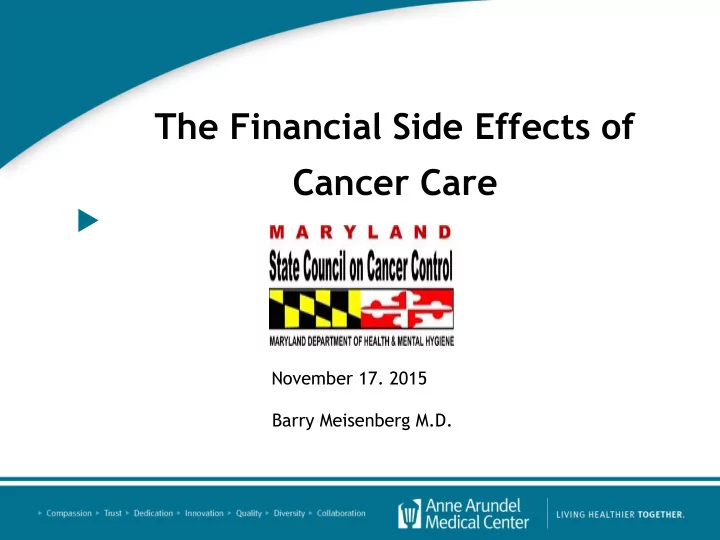

The Financial Side Effects of Cancer Care u November 17. 2015 Barry Meisenberg M.D.
Trending Topic • NY Times, NBC news, Washington Post, CBS 60 Minutes, PBS… 2
Scholarly interest in financial side effects also increasing. • PUB Med Citations for “Cancer Costs” double in 6 years . 852 articles in 2006 1895 articles in 2014 3
Why this Sudden Interests in Cancer Costs? • Cancer Costs are high and growing (>10% of total CMS spending) • Newly approved agents making headlines • Increasing % borne by patients – higher deductibles – more “cost sharing” – specialty pharmacy assigns more costs to pts. 4
NCI projections on National Cancer Costs (assumes no rise in costs) + 32% +28% + 19% http://costprojections.cancer.gov/graph.php# 5
NCI Prediction on Cancer Costs (assumes 3% increase) +61% +73% +32% http://costprojections.cancer.gov/graph.php# 6
“Financial Burden” : The total impact on financial status due to medical and non-medical costs and loss of family income. “Financial Distress”: Anxiety and Anguish related to financial concerns “Financial Toxicity”: The financial injury that follows cancer diagnosis and treatment-some of which MAY be modifiable Financial Burden Financial Financial Distress “Toxicity” 8
9
High Financial Stress is associated with: • Medication Non-adherence • Changed spending habits • Loss of savings/increased debt • Declaring bankruptcy • Poorer QOL • Inferior Pt. Satisfaction • Higher rate, and more severe depression in both pts and caregivers 10
True Facts About Financial Toxicity in Cancer Care • Common: 40-60% report at least moderate financial distress • Worldwide phenomenon • Long lasting (an inevitable consequence of survivorship?) 11
Behaviors AAMC n=132 Others Bha Behaviors Reduced 52% ----------- Discretionary Associated Spending with Liquidated -------- 30% investments Financial Distress Increased 26% 22% (MEDIAN Personal Debt $24,000) Delinquent 22% ---------- on Bills Reduced 6% 27%, 45% compliance with medications Declared 1.5% 5% personal bankruptcy 12
Cost Communication • ASCO guidelines (2009)recommend discussion of financial aspects of cancer RX • Surveys indicate pts desire this • But docs say: aware of pts financial issues “most of the time” (54%) AND “Always or Frequently” have cost discussions (43%) ∙ Pt surveys say this is rare (<20%) 13
Why so rare? Challenges of Cost Discussions • Doctors don’t know what things “cost” • Doctors don’t have expertise in different types of insurance policies • Ethical concerns about trading off costs for the potential for less efficacy • Uncertainty about how/when/what to discuss with patients 14
Cost Communication 15
What do patients think about costs and cost discussions? • Survey at AAMC – 132 patients receiving radiation or chemotherapy (94% response rate) – All insured, median income $50-75,000 16
Rates of Financial Distress n=132 surveys 28% Mean out of pocket costs $938/month 17
Discussing Cancer Costs • Only 30% felt well informed prior to therapy • 88% seldom or rarely spoke about the cost of cancer care with their oncologists. • Even among pts with high financial distress, 75% do not discuss costs. • Why Not? – 44% do not think it is the oncologists job – Worry that regimens would be altered based upon cost or doctor would think less of them. 18
Patients do not think society’s costs should influence treatment decisions "Overall costs to society should be a major factor in deciding among treatment options." 80 73.6 72.7 71.1 70 58.8 60 50 Percent 35.3 40 Disagree 30 22.6 19.3 Neutral 18.2 20 9.7 9.1 Agree 5.9 10 3.8 0 Low Financial Average High Financial Overall Wellness Financial Wellness Wellness 19
Patient’s (even low financial wellness patients) do not think their own costs should influence treatment decisions "My personal financial situation should be a major factor in deciding among treatment options ." 90 81.5 76.5 80 72.7 70.6 70 60 Percent 50 Disagree 40 Neutral 30 17.7 Agree 20 13.6 13.6 12.2 11.8 11.3 11.1 7.4 10 0 Low Financial Average Financial High Financial Overall Wellness Wellness Wellness 20
Even when it is assumed that lower cost regimens are equally effective, a minority of pts want the lower cost regimen prescribed "If there were more than one treatment plan that were roughly the same in terms of effectiveness, I would want my doctor to prescribe the less costly one for me." 60 50 50 44.9 42.9 41 40 30.8 Percent 28.6 28.6 28.2 28.1 27.8 27 30 Disagree 22.2 20 Neutral Agree 10 0 Low Financial Average High Financial Overall Wellness Financial Wellness Wellness 21
Bulloch et al. Patient attitudes toward Communication about the cost of cancer care. J Oncol Prac 2012 8(4):e50-58) 22
Cost Discussions? • Regular dialogue between oncologists and pt is rare • Both parties avoid it • Pts don’t necessarily desire discussion with their oncologists • Pts may not be willing partners in cost reduction discussions as advocated by ASCO – In other words, patients may not be “cost - sensitive” • Why not? 23
Why aren’t patients cost -sensitive? • Pts may believe that there is a single best therapy for their condition (only sometimes true). • ‘Anticipated regret’ • Bias toward newer or more costly drugs – Bias reinforced by pharma and cancer center marketing 24
Building expectations 25
The tag line- 26
Action Steps at DeCesaris Cancer Institute • Developed new financial burden communication procedures to identify, ameliorate and prevent financial toxicity. • Increased emphasis on ‘high value’ prescribing embraced by oncologists • Raising awareness 27
Focus on “Costs” is Cynical “What is a Cynic? “A man, who knows the price of everything but the value of Nothing” Oscar Wilde, Lady Windermere’s Fan 1893 28
Benefit Cost Side effects VALUE 29
Towards Value in Cancer Care • ASCO Value Framework • NCCN value advisories • But, what will patients think? – What do patients want/need to know? – Who participates in the Shared Decision Making with them? – When should the discourse begin? 30
Trouble Ahead 31
Recommend
More recommend